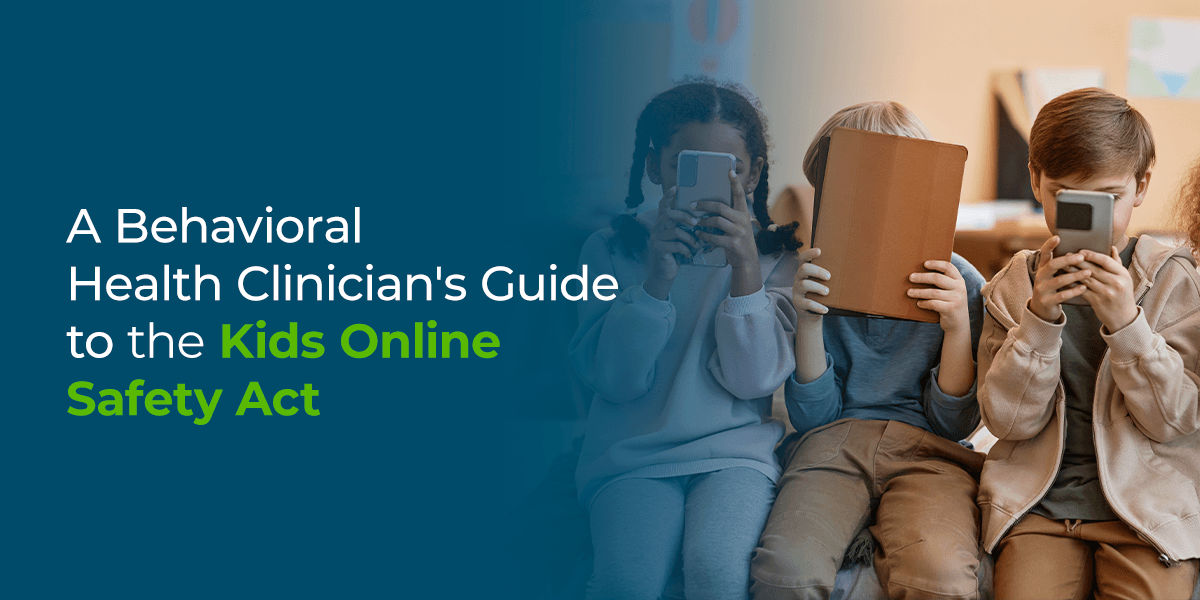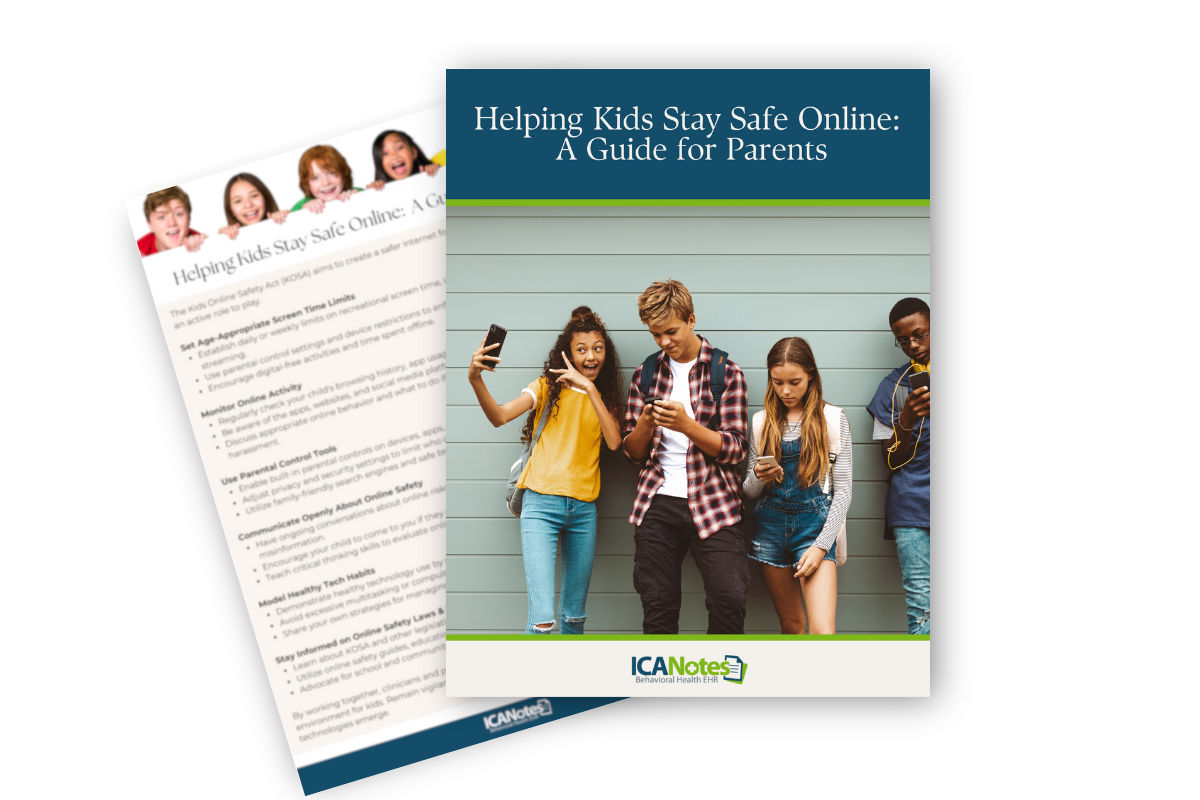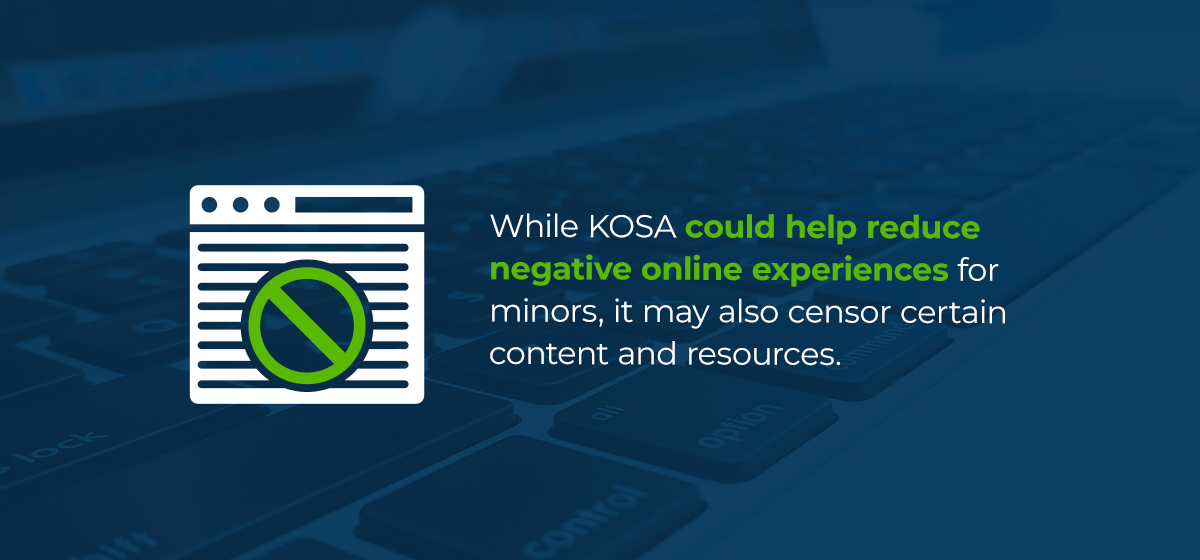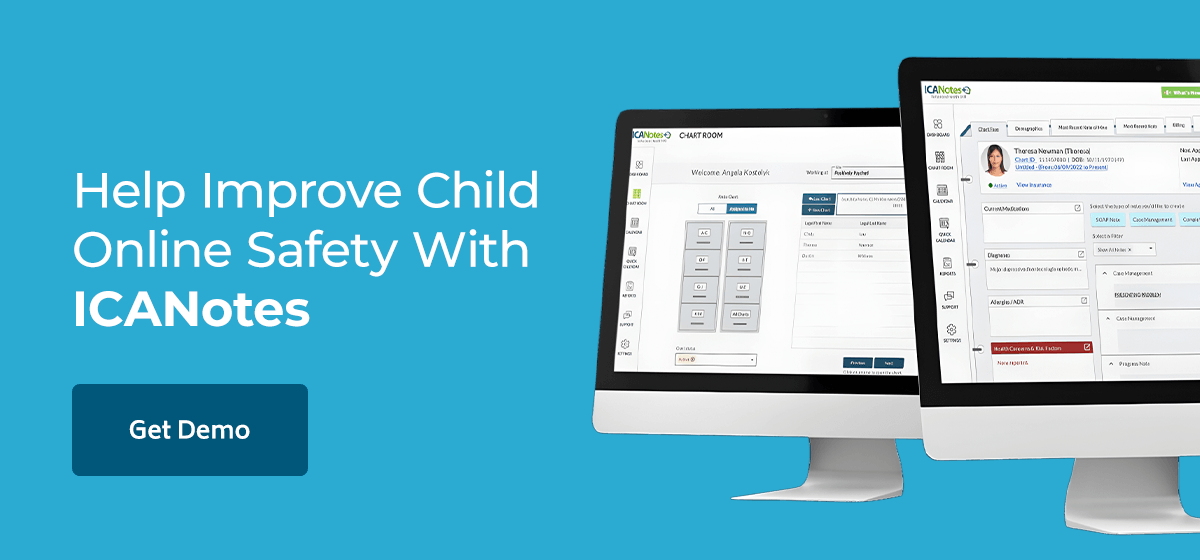
A Behavioral Health Clinician's Guide to the Kids Online Safety Act
Many parents are concerned about their children's online safety. The internet can be a great place to access free information and grow knowledge, but it can also be dangerous for children. Social media content and targeted advertisements can have harmful effects on young children, especially those who are able to access mature content.
The Kids Online Safety Act (KOSA) has been proposed and passed by the United States Senate with the goal of protecting children — defined as anyone under 13 — by banning targeted advertisements and the collection of personal data. As a family therapist or behavioral health professional, parents may look to you for advice on how to protect their kids online while giving them the freedom to learn, explore new communities, and connect with their friends. In this guide, we'll discuss some commonly asked questions about KOSA and address different viewpoints on this privacy legislation.
FREE DOWNLOAD:
Provide your client families with this essential guide to online safety, tailored for parents navigating today’s digital landscape. This resource offers practical strategies to set screen time boundaries, monitor online activity, and encourage open conversations about internet safety. Download the guide to help create a healthier, safer online environment for young minds.

What Does the Kids Online Safety Act Propose to Do?
KOSA was introduced by Senators Marsha Blackburn and Richard Blumenthal in 2022. They proposed the Kids Online Safety Act as a means of monitoring children's use of social media apps and websites to prevent:
- Cyberbullying
- Online harassment
- Social media addiction
- Sexual exploitation
- Eating disorders, depression and other mental health conditions
KOSA also outlined a "duty of care" for applicable websites, which would require online companies to employ safeguards to prevent children from being exposed to potentially harmful or negative content. These safeguards can be enabled to:
- Limit who can communicate with minors.
- Restrict children's personal data from public access.
- Limit notifications, autoplay and other potentially addictive features.
- Limit certain types of content, including bullying and violence.
- Reduce exposure to age-restricted products, such as gambling, alcohol and tobacco.
- Provide the ability to opt out of personalized recommendations.
- Restrict the minor's geolocation data.
- Allow minors to easily delete their accounts and collected data.
KOSA would also introduce new tools for parents to manage their children's account settings and privacy and allow them to report harmful content.
What Will Happen if KOSA Is Passed?
The U.S. Senate overwhelmingly passed KOSA in July 2024. If KOSA passes through the House, the "duty of care" will be partially enforced by state attorneys general. The Federal Trade Commission would have the power to decide what types of content are considered harmful to minors, as well as investigate and address violations.
Children would also have the power to opt out of personalized algorithmic recommendations, and applicable online platforms would likely default to the safest settings for all accounts believed to belong to minors.
Addressing Different Viewpoints on KOSA
Many parents and politicians believe the bill will help make the internet a safer place for children and reduce the harmful effects of prolonged screen time and exposure to mature content. KOSA passed 91 to 3 in the Senate with near unanimous support.
Others are concerned it violates free speech. For example, the Electronic Frontier Foundation claims KOSA may allow state officials to remove content or services they do not agree with at will. Some individuals opposed to KOSA also note that censoring certain websites and information could block access to diverse content, identities and resources.
An online petition to reject KOSA claims that because there is no consensus on what is inappropriate for minors, KOSA can simply be used as a tool to restrict a free and open internet. Additionally, those opposed to KOSA consider age verification and parental monitoring tools invasive and a potential risk for victims trying to escape domestic abuse and violence.
KOSA has been supported and criticized by liberals and conservatives for its potential to enable censorship on important topics and its efforts to protect child privacy online.

Kids Online Safety Act FAQ
Parents, guardians and therapists alike must all do their part to understand their role in child online safety. Here are common questions about KOSA to help you stay informed.
1. Does KOSA Affect Video Games?
Yes. KOSA applies to "covered platforms," which include multiplayer online video games, messaging applications and video streaming services. The Entertainment Software Association released a statement supporting KOSA and mentioned their common goal of creating fun and safe experiences for all young players.
2. Is KOSA Good or Bad?
There is no clear answer as to whether the Kids Online Safety Act is good or bad. Those who support and oppose the legislation present valid arguments. While KOSA could help reduce negative online experiences for minors, it may also censor certain content and resources. Those who oppose the bill also claim that KOSA and other content-filtering systems can result in discrimination by suppressing potentially vital content from diverse creators.
3. What Is KOSA's Role in Monitoring Social Media?
Social media networks fall under KOSA's "covered platforms," meaning certain social media companies will have to increase their monitoring technology to restrict what minors can do online. KOSA also proposes parental monitoring tools to help parents view their children's online activities.
Those opposed to KOSA feel these restrictions and higher levels of monitoring can limit kids' freedom to socialize online and reduce their digital competency for using the internet safely.
Navigating KOSA as a Behavioral Health Clinician
KOSA and mental health are closely intertwined. As a dedicated child counselor or psychologist, you understand the negative mental health impact that can result from children using the internet with no guardrails. In addition to cyberbullying, unregulated access to the internet can result in interactions with dangerous online predators, phishing scams and the sharing of private information.
Parents of children who have been bullied online may want to know how KOSA will help keep their children safe. Alternatively, parents of children from marginalized or underrepresented communities may express concerns over government officials deciding what's appropriate for their children.
Whether you agree with the legislation or not, it's your duty as a mental health professional to stay informed. The future of KOSA remains uncertain, but in the meantime, you can encourage the parents of your clients to both be an active participant in ensuring their children are safe online, and discuss online safety directly with their children so they can understand the potential benefits, as well as the potential dangers of being online. Parents can monitor their children's internet use themselves and look for signs like their children losing sleep, lying in order to use social media more, choosing social media over social interactions, or forgoing physical or in-person activities in favor of being online.
Why Trust ICANotes for Compliant Documentation?
As a behavioral health professional, your top priority is delivering the best possible care to your patients of all ages, but that doesn't mean you need to spend hours writing notes by hand. With ICANotes, you can reduce your documentation time without compromising the accuracy of your therapy notes. Our electronic health record (EHR) solution can help you achieve compliance with various federal and state regulations that govern patient privacy and personal data, including:
- Centers for Medicare & Medicaid Services.
- The Office for Civil Rights.
- The Office of the National Coordinator for Health Information Technology.
- The Department of Health and Human Services.
- The Agency for Healthcare Research and Quality.
ICANotes was designed by clinicians with years of experience in the behavioral health field who understand the complexity of these regulations. As new legislation passes in the upcoming years, it's essential for your practice to rely on software that meets all service standards.

Help Improve Child Online Safety With ICANotes
School counselors, child psychologists and behavioral health clinicians have an ethical obligation to stay informed on legislation that impacts patients. Staying up to date on the latest online privacy laws can help you keep parents informed and allow them to make the best decisions for, and alongside their children.
You can take a proactive step toward child online safety by protecting your patients who are minors with compliant, secure software. ICANotes enables you to take clinically relevant, comprehensive notes for clients of all ages that meet even the strictest standards. Our mental health charting solution is a powerful tool you can use to provide cohesive, coordinated care and protect your patient's personal data. Start your free trial today, or request a live demo to learn more!


